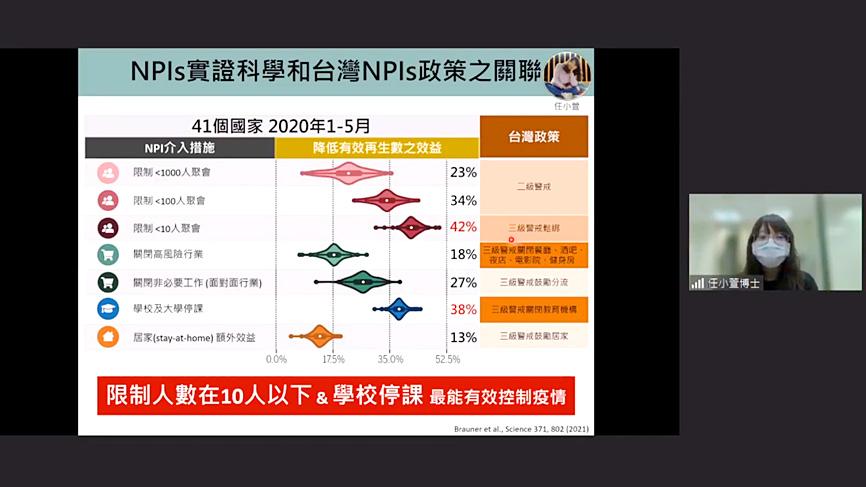Aside from boosting the nation’s COVID-19 vaccination coverage, implementation of nonpharmaceutical interventions (NPIs) is key to controlling the COVID-19 pandemic, as the Delta variant of SARS-CoV-2 spreads around the world, infecting even fully vaccinated people, public health experts said yesterday.
In his weekly online broadcast on the latest COVID-19 situation, National Taiwan University College of Public Health professor Tony Chen (陳秀熙) analyzed the correlation between number of cases, mortality rates, level of NPIs, vaccination coverage and the GDP of several countries.
The Delta and Alpha variants of SARS-CoV-2 have been the two main strains since May, but the former is rapidly outpacing the latter to become the dominant strain, causing a surge in cases in many countries and more vaccine breakthrough infections, he said.

Screen grab by Wu Po-hsuan, Taipei Times
Breakthrough cases refer to people testing positive for COVID-19, despite being fully vaccinated for at least 14 days.
A US study last month showed that 346 people, or 74 percent, of the 469 cases of COVID-19 associated with multiple summer events and large public gatherings in a town in Massachusetts were fully vaccinated, and genomic sequencing of specimens from 133 patients identified that 90 percent were infected with the Delta variant, he said.
Another study conducted in Israel when the Alpha variant was dominant showed that 39 vaccine breakthrough infections, or 2.6 percent, were found among 1,497 fully vaccinated healthcare professionals, but most of them were asymptomatic or had mild symptoms, he said.
The data suggest that even in places where the vaccination coverage is relatively high, the Delta variant can still cause a small surge in cases, Chen said.
NPIs, such as wearing a mask and maintaining social distancing, are still important to avoid catching the virus, even for people who have completed the vaccine regimen, he added.
An analysis of NPI measures adopted by other countries shows that the most effective measures to lower the reproduction number of COVID-19 are limiting the number of people in gatherings to fewer than 10 and suspending school, Chen’s research team said.
Taiwan should conduct a rolling review of COVID-19 prevention and response guidelines for high-risk public venues, such as gyms, restaurants and wedding banquets, which have been conditionally reopened, the team said.
In Taiwan, Alpha is still the dominant strain, infection and death numbers are relatively low, the NPI level is relatively high and vaccine coverage is growing, so the risk of a local COVID-19 outbreak is expected to remain low, Chen said.
While Taiwan has lowered the nationwide COVID-19 alert to level 2, it should continue to implement NPIs as a key measure to contain the virus, especially in the face of the Delta variant spreading around the world, he added.

Eight restaurants in Taiwan yesterday secured a one-star rating from the Michelin Guide Taiwan for the first time, while three one-star restaurants from last year’s edition were promoted to two stars. Forty-three restaurants were awarded one star this year, including 34 in Taipei, five in Taichung and four in Kaohsiung. Hosu (好嶼), Chuan Ya (川雅), Sushi Kajin (鮨嘉仁), aMaze (心宴), La Vie by Thomas Buhner, Yuan Yi (元一) and Frassi in Taipei and Front House (方蒔) in Kaohsiung received a one-star rating for the first time. Hosu is known for innovative Taiwanese dishes, while Chuan Ya serves Sichuan cuisine and aMaze specializes

STATS: Taiwan’s average life expectancy of 80.77 years was lower than that of Japan, Singapore and South Korea, but higher than in China, Malaysia and Indonesia Taiwan’s average life expectancy last year increased to 80.77 years, but was still not back to its pre-COVID-19 pandemic peak of 81.32 years in 2020, the Ministry of the Interior said yesterday. The average life expectancy last year increased the 0.54 years from 2023, the ministry said in a statement. For men and women, the average life expectancy last year was 77.42 years and 84.30 years respectively, up 0.48 years and 0.56 years from the previous year. Taiwan’s average life expectancy peaked at 81.32 years in 2020, as the nation was relatively unaffected by the pandemic that year. The metric

Taiwan High Speed Rail Corp. (THSRC) plans to ease strained capacity during peak hours by introducing new fare rules restricting passengers traveling without reserved seats in 2026, company Chairman Shih Che (史哲) said Wednesday. THSRC needs to tackle its capacity issue because there have been several occasions where passengers holding tickets with reserved seats did not make it onto their train in stations packed with individuals traveling without a reserved seat, Shih told reporters in a joint interview in Taipei. Non-reserved seats allow travelers maximum flexibility, but it has led to issues relating to quality of service and safety concerns, especially during

A magnitude 5.1 earthquake struck Chiayi County at 4:37pm today, the Central Weather Administration (CWA) said. The hypocenter was 36.3km southeast of Chiayi County Hall at a depth of 10.4km, CWA data showed. There were no immediate reports of damage resulting from the quake. The intensity of the quake, which gauges the actual effect of a seismic event, measured 4 in Chiayi County, Tainan and Kaohsiung on Taiwan's seven-tier intensity scale, the data showed. The quake had an intensity of 3 in Chiayi City and Yunlin County, while it was measured as 2 in Pingtung, Taitung, Hualien, Changhua, Nantou and Penghu counties, the data